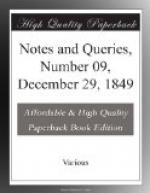“We are informed that Sir John Vanbrugh, in his scheme for new paving the cities of London and Westminster, among other things, proposes a tax on all gentlemen’s coaches, to stop all channels in the street, and to carry all the water off by drains and common sewers under ground.”
Sir John Vanbrugh was chiefly known as an architect of noblemen’s and gentlemen’s mansions. Can any of your readers supply me with a reference to any detailed plan, from Sir John, for the general improvement of the metropolis?
B.M.
Becket’s Grace-Cup.—The inscription round the neck of this so-called cup, of which a representation is given in No. 1. of Mr. Scott’s Antiquarian Gleanings, is thus printed by him—GOD FERARE—: to which he adds, in explanation, “probably the name of the goldsmith.” {143} At the foot of an earlier print of this relic, the inscription is given thus—FERARE GOD—and till the appearance of Mr. Scott’s version, I had considered the former word as an accidental error of the engraver, instead of FEARE; which would present a moral motto, suiting the SOBRII ESTOTE round the lid.—As Mr. Nichols, in his recent interesting work on Pilgrimages to Walsingham and Canterbury, noticing the misnomer of the cup (p. 229, n.), indicates its date to be of “the early part of the sixteenth century,” perhaps some one of your well-informed readers could state if any artist-goldsmith of that era, and of that name, be known.
ALICUI.
Sir Henry Herbert’s Office-Book.—I should be glad to know if any of your readers can tell me the “whereabouts” of Sir Henry Herbert’s Office-Book, a MS. frequently referred to by Malone, Chalmers, and Collier. Sir Henry Herbert was Master of the Revels to King James the First, and the two succeeding kings, and the said MS. contains an account of almost every piece exhibited at any of the theatres from August, 1623, to the commencement of the rebellion in 1641. Malone, in his Historical Account of the English Stage (edit. Boswell, iii. 57.), says, in a note—
“For the use of this very curious and valuable manuscript I am indebted to Francis Ingram, of Ribbisford, near Bewdley, in Worcestershire, Esq., Deputy Remembrancer in the Court of the Exchequer. It has lately been found in the same old chest which contained the manuscript Memoirs of Lord Herbert of Cherbury, from which Mr. Walpole, about twenty years ago, printed the life of that nobleman, who was elder brother to Sir Henry Herbert.”
In another place, Malone adds:—
“This valuable manuscript, having lain for a considerable time in a damp place, is unfortunately damaged, and in a very mouldering condition; however, no material part of it appears to have perished.”
Such being the case, it becomes more than ever desirable that this interesting volume should be sought after, and the whole of its contents put on record before its total decay. Surely, if its depositary is known, and accessible, it is well worth the attention of the Shakespeare Society, or some other learned body instituted for the preservation of documents of this nature.




